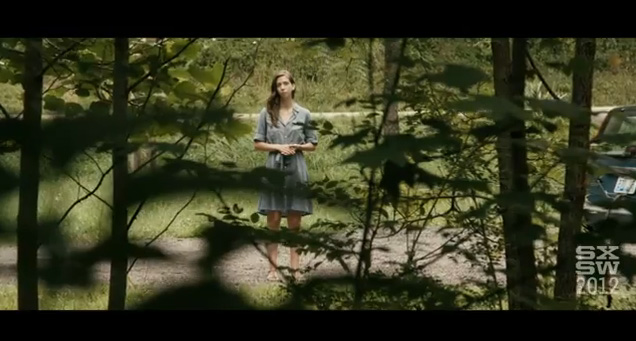
Two Outstanding Films by Female Directors at SXSW 2012
Unlike the Academy Awards and Golden Globes — which both seem to deny the existence of talented female filmmakers — SXSW Film tends to feature an amazingly strong array of female filmmakers in their program each year. The program for SXSW Film 2012 is certainly no exception; in fact, two of my favorite films of this year’s program are by female writer-directors: Martha Stephens’ Pilgrim Song and Amy Seimetz’s Sun Don’t Shine.
Pilgrim Song begins as James (Timothy Morton) is laid off from his job as a public middle school music teacher. Additionally, the spark in his long-term relationship with Joan (Karrie Crouse) has fizzled out. James thus finds himself stuck in an existential quagmire. Rather than dealing with his employment and relationship issues head-on, James builds a wall around himself in a desperate attempt to shut down all human interaction. James decides that the best way to deal with everything is to embark upon a solitary journey on Kentucky’s Sheltowee Trace Trail.
A solitary journey also means a silent and contemplative one. With no one for James to converse with, Alexander Sablow’s cinematography must rely solely upon lush visual compositions (and the support of an amazing soundtrack composed by Andrew Iafrate and Jonathan Wood) to transport us into James’ mindset. As James is lulled into a tranquil meditative state by his meandering hike, we are too. It is not too long, though, before James begins to encounter other characters along his epic-like odyssey. We witness as these chance meetings slowly chip away at the wall that James has constructed around himself; James ultimately gets to the point that he is finally able to talk about his feelings.
When most people think of female directors they assume that the films will portray strong female lead characters; but, with Pilgrim Song, Stephens and co-writer Karrie Crouse develop an extraordinarily profound portrayal of James. Stephens and Crouse delve deep into the male psyche in their representation of the male tendency to run away from problems rather than talk about them.
Writer-director Amy Seimetz is being purposefully secretive about her narrative debut, Sun Don’t Shine. This is definitely one of those films that should be viewed with little to no information about the plot, so I will refrain from giving anything away. Two young lovers, Crystal (Kate Lyn Sheil) and Leo (Kentucker Audley), are covered in sweat and grime as they drive across Florida in a car with no air conditioning during a brutally hot and humid summer. The car functions as a claustrophobic pressure cooker, causing tensions and fears to boil to the surface.
Crystal represents the essence of pure, unhinged emotion; when she is not crying and screaming, we find her on the verge of crying and screaming. Leo is the complete opposite — he desperately tries to maintain his cool, calm and collected demeanor. Sun Don’t Shine is a brutally intense rollercoaster ride of a film that takes its time in revealing the details of Crystal and Leo’s past.
Going into Sun Don’t Shine, I assumed that I would love it (and I did!) because Sheil (Green, Silver Bullets) and Audley (Bad Fever) gave some of the best performances of 2011 — at least in the world of micro-budget cinema. With Sun Don’t Shine, Sheil and Audley up the ante by giving career-defining performances. (Audley does not consider himself to be an actor, but I think Bad Fever and Sun Don’t Shine certainly prove otherwise.)
Both Pilgrim Song and Sun Don’t Shine set a really high bar for narrative cinema in 2012. I am hard-pressed to find films that I love as much as both of these.
